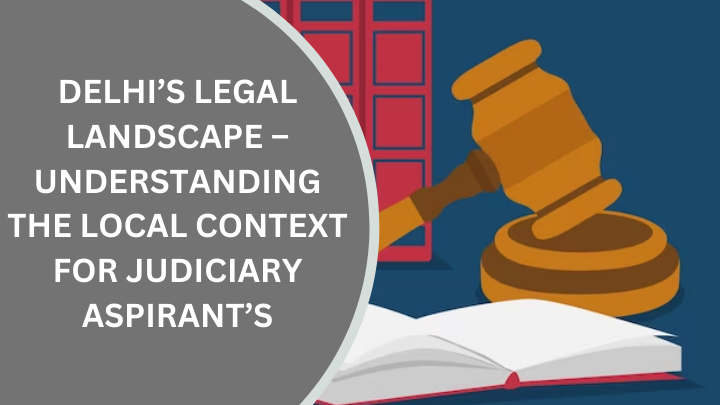Delhi’s legal landscape is a complex amalgamation of historical legacies and contemporary complexities, mirroring the city’s diverse socio-economic composition. Understanding this is pivotal for judiciary aspirants, as it necessitates a nuanced comprehension of the local context.
The capital of India, possesses a legal terrain that is intricate and dynamic, necessitating a nuanced understanding from those aspiring to be judges. The city’s judicial framework comprises crucial components such as the High Court of Delhi, an array of district courts, and specialized tribunals. For prospective judges, a deep comprehension of Delhi's legal complexities is not just advantageous but indispensable. At the zenith of Delhi's legal hierarchy is the High Court of Delhi, functioning as an appellate authority handling a diverse range of cases, including constitutional matters of significant consequence. Aspiring judges must acquaint themselves with the precedents established by this court, as they often shape legal discussions on a national scale. The decisions of the High Court serve as guiding principles, exerting influence on judgments throughout lower courts.
- District courts, spread across Delhi, are the foundation of the local judicial system. They handle a wide range of cases, from everyday contract disputes to criminal prosecutions. Aspiring judges need to understand the rules and procedures, as they will decide on matters directly affecting the lives of Delhi's residents. Being able to navigate through this diverse workload is essential for judges to ensure fair and efficient justice. Apart from the High Court and district courts, there are special tribunals in Delhi focusing on specific areas like labor, environment, and consumer issues. Aspiring judges must grasp how these tribunals work and their jurisdiction to fully understand Delhi's legal landscape. Specialized knowledge helps judges handle cases in these areas effectively, contributing to the quick resolution of disputes in these specific domains. Delhi being the national capital poses extra challenges for its judiciary. It's a blend of diverse cultures, ideas, and backgrounds, creating a unique legal situation. Aspiring judges need to understand the local context, sensing the diversity of Delhi's population. Cases often go beyond legal boundaries, involving social and political factors, requiring judges who can navigate the intricate relationship between law and society.
The rapid urban growth in Delhi brings forth a multitude of legal challenges. As the city expands, issues such as land disputes become increasingly common. These disputes may arise due to factors like unclear property boundaries, zoning regulations, or conflicting land use plans. Aspiring judges must be well-versed in property and land laws to fairly adjudicate these cases and provide resolutions that align with legal standards. Moreover, the intricate governance structures in Delhi give rise to administrative issues that find their way into the legal domain. Administrative decisions may face legal scrutiny, particularly when individuals or organizations perceive them as unfair or in violation of established laws. Judges need a comprehensive understanding of administrative law to evaluate the legality and fairness of government actions, ensuring that administrative decisions adhere to legal principles. Familiarity with administrative and municipal laws is crucial for aspiring judges as these laws govern the functioning of local bodies, government agencies, and municipal corporations. These laws dictate how local governance is structured, how public services are delivered, and how regulatory frameworks are established. Judges equipped with knowledge in this area can effectively adjudicate cases involving administrative decisions, municipal regulations, and governance matters, contributing to the smooth functioning of the city.
Pahuja Law Academy conducts classes via hybrid mode which includes offline and online way of learning and is also recognized as the best online coaching for judiciary exams and the best judiciary coaching in Delhi, as we play a pivotal role in guiding judiciary aspirants through Delhi's intricate legal landscape, fostering a nuanced understanding of the local context.
PLA’s specialized curriculum for judiciary exams, is designed to unravel Delhi's legal intricacies including the other states as well. It immerses aspirants in local laws, landmark cases, and unique challenges, ensuring a nuanced understanding of the legal terrain in Delhi, beyond general principles. The faculty, comprising experienced legal experts entrenched in Delhi's judiciary, offers practical insights, providing a real-world perspective. This seasoned faculty, aids aspirants in comprehending the intricacies of Delhi's legal system. We refine examination strategies through mock tests and practice papers, mirroring Delhi's judiciary exams. This helps aspirants familiarize themselves with likely questions, enhancing skills and confidence. Staying updated with current legal updates, the academy, acknowledged as the best online coaching for judiciary exams, informs aspirants about recent legal changes. This ensures they are well-prepared for contemporary issues in exams and future roles. In pursuit of excellence, we provide a holistic learning environment transcending theoretical knowledge. Practical exercises and exposure to real-world scenarios equip aspirants with skills to navigate Delhi's legal complexities. In essence, Pahuja Law Academy's multifaceted approach, recognized as the best online coaching for judiciary exams and the best judiciary coaching in Delhi, covering a specialized curriculum, experienced faculty, practical exercises, and exposure to real-world experiences, prepares judiciary aspirants for Delhi's judiciary exams and helps them navigate the unique aspects of the local legal context.



